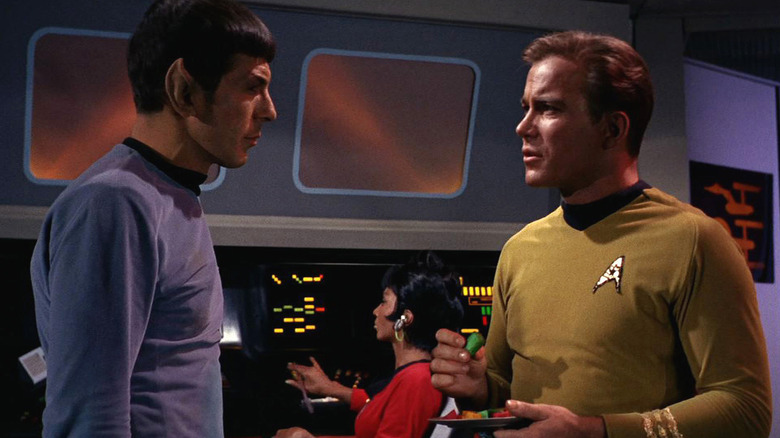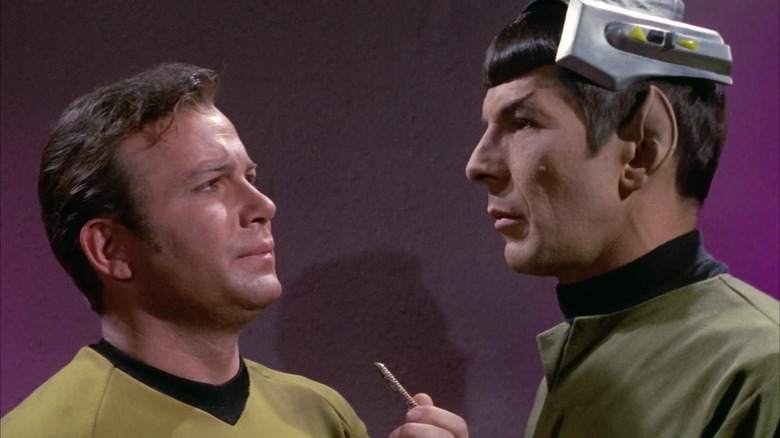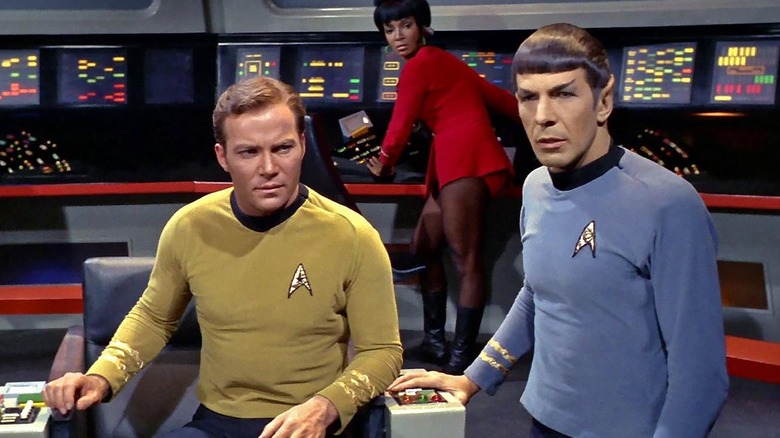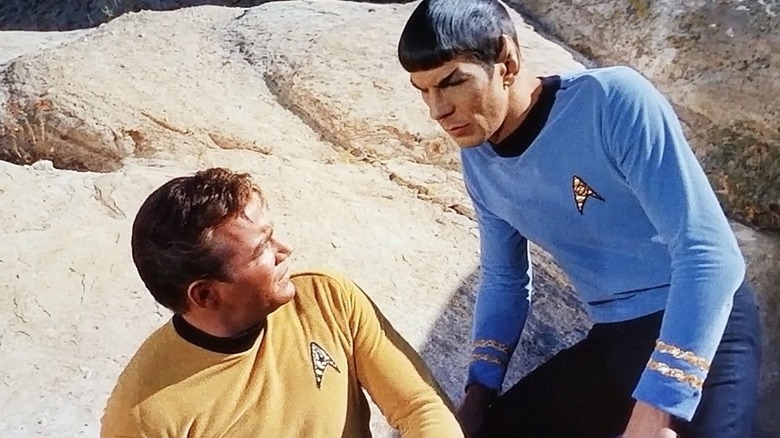Gene Roddenberry's Threatening Star Trek Letter To Leonard Nimoy And William Shatner
The opening credits of the original "Star Trek" listed only three members of the cast: William Shatner as Captain Kirk, Leonard Nimoy as Mr. Spock, and DeForest Kelley as Dr. Leonard McCoy. The rest of the show's cast — Nichelle Nichols, George Takei, James Doohan, and Walter Koenig — were listed in the closing credits.
Modern Trekkies tend to think of every "Star Trek" show as an ensemble piece. For fans, each member of the cast was just as important as any other member, and every character was given an opportunity to shine in episodes written entirely for them. To be sure, the captains on each "Trek" show received more stories than any other character — after all, they had the hardest job — but that didn't make the lower-ranking officers any less important. The egalitarian approach to the shows' ensembles is in keeping with the central themes of the franchise. "Star Trek" takes place in a future where everyone is listened to and considered because everyone is intelligent and eager to contribute to the betterment of humankind.
Shatner and Nimoy did not share this view. Indeed, it seems that because they received top billing, the two actors both figured they should be the stars of the show. There were other regular characters, yes, but Shatner and Nimoy were happy to upstage them and keep them relegated off to the side while they each hogged the spotlight. Shatner's treatment of his co-stars has been reported numerous times and several "Star Trek" actors have hated him for years.
When Shatner's and Nimoy's egos became too large for the room, show creator Gene Roddenberry wrote a harshly worded letter, handily preserved in the pages of "The Fifty-Year Mission: The Complete, Uncensored, Unauthorized Oral History of Star Trek: The First 25 Years."
'You've driven me to the edge of not giving a damn'
Gene Roddenberry, writing in 1967, was clearly reacting to various stories from the "Star Trek" set claiming William Shatner and Leonard Nimoy were on their worst behavior. It seems they were swapping lines, taking dialogue from co-stars, and going all-out to get as much screen time as possible. "Star Trek," unlike some other shows at the time, had an open-door policy at NBC, allowing actors to air grievances, explore ideas, and examine characters earnestly with those at the top. By Roddenberry's description, this privilege was being abused. Shatner and Nimoy would cause delays in shooting and their characters would start to change on camera. Roddenberry, wanting to put the kibosh on his prima donnas, wrote the following letter, which was addressed to both actors equally:
"Toss these pages in the air if you like, stomp off and be angry, it doesn't mean that much since you've driven me to the edge of not giving a damn. [...] No, William, I'm not really writing this to Leonard and just including you as a matter of psychology. I'm talking to you directly and with an angry honesty you haven't heard before. And Leonard, you'd be very wrong if you think I'm really teeing off at Shatner and only pretending to include you. The same letter to both; you've pretty well divided up the market on selfishness and egocentricity."
Roddenberry knew that actors all have egos and that petty grievances would indeed arise from time to time. Gene evidently instructed the production offices to overlook any foul moods from the cast, as tensions can run high and forgiveness will keep hackles lowered and production smooth. But after too many complaints, Roddenberry admitted, "'Star Trek' is going down the drain."
A half-assed Queeg
Gene Roddenberry was proud of the "input system" he had installed for his actors but was clearly cheesed off when William Shatner and Leonard Nimoy took advantage of it. Their goal, it seemed, was clear: dominate the show. Shatner and Nimoy, being the stars, felt they should be catered to as much as possible. Roddenberry saw the ego leaking into the fabric of the show itself and felt Captain Kirk was changing from a stalwart, reasoned leader into a petty tartar. He compared Kirk to the bitter, cruel captain from the U.S.S. Caine, writing:
"I want you to realize fully where your fight for absolute screen dominance is taking you. It's already affecting the image of Captain Kirk on the screen. We're heading for an arrogant, loud, half-assed Queeg character who is so blatantly insecure upon that screen that he can't afford to let anyone else have an idea, give an order, or solve a problem. You can't hide things like that from an audience."
And lest you think that Roddenberry was picking on William Shatner, he saw similar shenanigans from Nimoy. The "Star Trek" creator wanted to make sure both of the show's main stars were being targeted by his comments. Nimoy wasn't merely pushing back. He was also vying for space. Roddenberry wrote:
"And now, Leonard. I must say that if I were Shatner, I'd be nervous and edgy about you by now, too. For a man who makes no secret of his own sensitivity, you show a strange lack of understanding of it in your fellow actors."
Ouch. This is not the kind of letter one wants to receive from their boss.
Putting the foot down
Gene Roddenberry wanted to put his foot down. The written tongue-lashing was intended to keep his actors in check and to keep production smooth. "Star Trek" has a tight production schedule and Roddenberry would be damned if he would allow impetuous stars to continue to slow things down. He also let William Shatner and Leonard Nimoy know that their directors were going to be harder and sterner moving forward ... because they'd be fired if they weren't. Roddenberry wrote:
"For as long as I stay with the show, starting Monday, there will be no more line switches from one to another. No more of the long discussions about scenes which lose us approximately a half day of production a show — the director will permit it only when there is a valid dramatic story or interpretation point at stake which he believes makes it necessary. The director will be told he is also replaceable, and failure to stay on top and in charge of the set will be grounds for his dismissal."
While DeForest Kelley was not expressly mentioned in the letter, Roddenberry wanted to include him in the missive, perhaps as a warning to not behave the way Shatner and Nimoy were. Roddenberry signed off with: "All right, my three former friends and 'unique professionals,' that's it. In straight talk."
Ultimately, of course, "Star Trek" would find new life in syndication, expand in popularity in the 1970s, and become one of the largest sci-fi franchises of all time. Once feature films were being made and "Star Trek" VHS tapes were circulating, Roddenberry seems to have chilled out. But, golly, one might assume Shatner and Nimoy were humbled by such a note.



